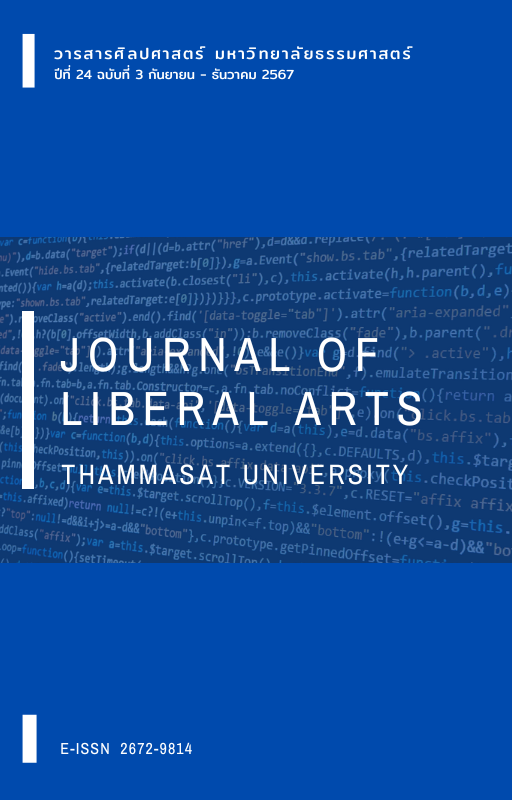การกล่าวออกตัวในภาษาไทย : เครื่องมือลดการคุกคามหน้าหรือวัจนกรรมตรง?
Main Article Content
บทคัดย่อ
ภาษาเป็นเครื่องมือสำคัญประการหนึ่งที่มนุษย์ใช้เพื่อรักษาและกระชับความสัมพันธ์อันดีระหว่างบุคคล นอกจากนี้การใช้ภาษายังสะท้อนให้เห็นถึงความพยายามของผู้ใช้ในการลดปัญหาที่อาจจะเกิดขึ้นหรือกระทบกับความสัมพันธ์อันดีระหว่างบุคคลอีกด้วย ในปัจจุบันพบว่า การกล่าวออกตัวเป็นกลวิธีทางภาษาที่ใช้กันอย่างแพร่หลายทั้งในสื่อต่าง ๆ เช่น ละคร รายการโทรทัศน์ รายการวิทยุ สื่อสังคมออนไลน์ อย่างไรก็ตามที่ผ่านมาพบว่า การใช้การกล่าวออกตัวในภาษาไทยมักก่อให้เกิดผลหรือความรู้สึกที่หลากหลาย ดังนั้นในงานวิจัยนี้จึงมีจุดมุ่งหมายเพื่อศึกษาหน้าที่ของการกล่าวออกตัวในภาษาไทยที่เกิดก่อนถ้อยความที่มีลักษณะของการวิพากษ์วิจารณ์ 2 โครงสร้าง ได้แก่ “ไม่ได้ ... นะ แต่ ...” และ “อย่าหาว่า ... เลยนะ แต่ ...” โดยใช้ข้อมูลจากการสัมภาษณ์แบบกึ่งโครงสร้างจากผู้ให้สัมภาษณ์ที่เป็นคนไทยที่มีภูมิหลังทางสังคมที่แตกต่างกัน จำนวน 30 คน ผลการศึกษาพบว่า การกล่าวออกตัวในภาษาไทยมีหน้าที่ที่หลากหลาย เช่น เพื่อลดความรุนแรงของการคุกคามหน้า เพื่อเตือนคู่สนทนาถึงผลกระทบทางลบที่อาจเกิดขึ้นกับตน และโดยเฉพาะอย่างยิ่งเพื่อปฏิเสธความรับผิดชอบต่อผลทางลบที่อาจเกิดขึ้นจากถ้อยความที่ผลิตออกมา รวมไปถึงเพื่อเน้นย้ำให้เห็นถึงเจตนาในการสื่อสารที่แท้จริง ทั้งนี้ขึ้นอยู่กับบริบททางภาษา บริบททางสังคม และโดยเฉพาะบทบาทของผู้ใช้ภาษาในสถานการณ์การสื่อสารครั้งนั้น ๆ ผลจากการศึกษาชี้ให้เห็นถึงข้อจำกัดของทฤษฎีและวิธีการเก็บข้อมูลที่ใช้เพื่อศึกษาและอธิบายการใช้การกล่าวออกตัวในภาษาไทย
Downloads
Article Details

อนุญาตภายใต้เงื่อนไข Creative Commons Attribution-NonCommercial-NoDerivatives 4.0 International License.
เอกสารอ้างอิง
ซูม. (12 กุมภาพันธ์ 2561). คนไทยกับ “อารมณ์ขัน” หน้าสิ่วหน้าขวานก็ขันได้. ไทยรัฐออนไลน์. https://www.thairath.co.th/news/politic/1201263
พิมลพรรณ อิศรภักดี และ ฐิตินันทน์ ผิวนิล. (2561). หน่วยที่ 12 ครอบครัวในวิถีไทย. ใน มหาวิทยาลัยสุโขทัยธรรมาธิราช, เอกสารการสอนชุดวิชาวิถีไทย หน่วยที่ 9-15 (น. 1-82). สำนักพิมพ์มหาวิทยาลัยสุโขทัยธรรมาธิราช.
วัฒนา วงศ์เกียรติรัตน์ และ จิตรา วีรบุรีนนท์. (2559). หน่วยที่ 8 ชุมชนชนบท. ใน มหาวิทยาลัย สุโขทัยธรรมาธิราช, เอกสารการสอนชุดวิชาสังคมและวัฒนธรรมไทย หน่วยที่ 8-15 (น. 1-37). สำนักพิมพ์มหาวิทยาลัยสุโขทัยธรรมาธิราช.
วิภาพร กล้าวิกย์กิจ. (2548). อารมณ์ขันในข้อความสั้นสำเร็จรูป [สารนิพนธ์ปริญญามหาบัณฑิต มหาวิทยาลัยศรีนครินทรวิโรฒ]. สำนักหอสมุดกลาง มหาวิทยาลัยศรีนครินทรวิโรฒ. http://thesis.swu.ac.th/swuthesis/Tha/Wipaporn_G.pdf
สาคร สมเสริฐ. (2562). หน่วยที่ 2 โลกทัศน์ไทยในมิติทางสังคม. ใน มหาวิทยาลัย สุโขทัยธรรมาธิราช, เอกสารการสอนชุดวิชาโลกทัศน์ไทย หน่วยที่ 1-8 (น. 1-60). สำนักพิมพ์มหาวิทยาลัยสุโขทัยธรรมาธิราช.
สำราญ ผลดี. (2561). ไทยศึกษา. สำนักพิมพ์แห่งจุฬาลงกรณ์มหาวิทยาลัย.
อำนาจ ปักษาสุข และ อนุชิต ตู้มณีจินดา. (2566). การกล่าวออกตัวและความสำคัญของข้อมูลการตระหนักรู้ทางอภิวัจนปฏิบัติศาสตร์. วารสารศิลปศาสตร์, 23(3), 659-685.
Abdi, R. (2012). Smoothing the rough edges: Towards a typology of disclaimers in research articles. Pragmatics, 22(3), 355-369.
Ajayi, T. M. (2022). Metapragmatic disclaimers in Yoruba discursive interactions. Southern African Linguistics and Applied Language Studies, 40(2), 212-226. https://doi.org/10.2989/16073614.2022.2049834
Bongelli, R., Zuczkowski, A., & Riccioni, I. (2023). The Italian epistemic disclaimer Non so [I don’t know] in a corpus of gynaecological interactions. Languages, 8(4), 226. https://doi.org/10.3390/languages8040226
Braun, V., & Clarke, V. (2006). Using thematic analysis in psychology. Qualitative Research in Psychology, 3(2), 77-101.
Brown, P., & Levinson, S. C. (1987). Politeness: Some universals in language usage. Cambridge University Press.
Caffi, C. (2007). Mitigation. In M. Sbisà & K. Turner (Eds.), Pragmatics of speech actions (pp. 257-286). De Gruyter Mouton.
Culpeper, J. (1996). Towards an anatomy of impoliteness. Journal of Pragmatics, 25, 349-367.
El-Alayli, A., Myers, C. J., Petersen, T. L., & Lystad, A. L. (2008). “I Don't mean to sound arrogant, but...”: The effects of using disclaimers on person perception. Personality and Social Psychology Bulletin, 34(1), 130-143.
Ercan, G. S. (2019). “Ama (But)” as a disclaimer and its functions in Turkish daily discourse. In V. Krystev, R. Efe, & E. Atasoy (Eds.), Theory and practice in social sciences (pp. 308-317). St. Kliment Ohridski University Press.
Fraser, B. (1980). Conversational mitigation. Journal of Pragmatics, 4(4), 341-350.
Fraser, B. (1990). Perspectives on politeness. Journal of Pragmatics, 14(2), 219-236.
Grice, H. P. (1975). Logic and conversation. In P. Cole & J. Morgan (Eds.), Syntax and semantics (Volume 3, pp. 41-58). Academic Press.
Hewitt, J. P., & Stokes, R. (1975). Disclaimers. American Sociological Review, 40, 1-11.
Hongladarom, K. (2007). “Don’t blame me for criticizing you...”: A study of metapragmatic comments in Thai. In W. Bubliz & A. Hübler (Eds.), Metapragmatics in use (pp. 29-47). John Benjamins.
Liu, X. (2022). An interpersonal metapragmatic account of the Chinese formulaic disclaimer “bushi wo V (P) ni” [Doctoral dissertation, University of Antwerp]. UAntwerpen Institutional Repository (IRUA). https://hdl.handle.net/10067/1910360151162165141
Nesbit, R. J., & Watling, D. (2019). The role of audience familiarity and activity outcome in children’s understanding of disclaimers. British Journal of Developmental Psychology, 37(2), 230-246.
Overstreet, M., & Yule, G. (2001). Formulaic disclaimers. Journal of Pragmatics, 33(1), 45-60.
Parvaresh, V. (2016). Metapragmatic pragmemes. In K. Allen, A. Capone, & I. Kecskes (Eds.), Pragmemes and theories of language use (pp. 521-535). Springer.
Ran, Y. (2015). Metapragmatic negation as a rapport-oriented mitigating device. Journal of Pragmatics, 84, 190-203.
Shapiro, D. L., & Bies, R. J. (1994). Threats, bluffs, and disclaimers in negotiations. Organizational Behavior and Human Decision Processes, 60(1), 14-35.
Spencer-Oatey, H. (2011). Conceptualising ‘the relational’ in pragmatics: Insights from metapragmatic emotion and (im)politeness comments. Journal of Pragmatics, 43(14), 3565-3578.
Stokes, R., & Hewitt, J. P. (1976). Aligning actions. American Sociological Review, 41(5), 838-849.
Tayebi, T., & Parvaresh, V. (2014). Conversational disclaimers in Persian. Journal of Pragmatics, 62, 77-93.
Toomaneejinda, A. (2018). An exploratory study of expressing disagreement in ELF academic group discussion (Order No. 13830804) [Doctoral dissertation, Lancaster University]. ProQuest Dissertations and Theses Global.
Toomaneejinda, A., & Harding, L. (2018). Disagreement practices in ELF academic group discussion: Verbal, nonverbal and interactional strategies. Journal of English as a Lingua Franca, 7(2), 307-332.
van der Meij, S., Gosen, M., & Willemsen, A. (2024). ‘Yes? I have no idea’: teacher turns containing epistemic disclaimers in upper primary school whole-class discussions. Classroom Discourse, 15(1), 1-23. https://doi.org/10.1080/19463014.2022.2103008
Warren, P. (2013). Introducing psycholinguistics. Cambridge University Press.
Watling, D., & Banerjee, R. (2012). Children’s understanding of disclaimers. Social Cognition, 30(1), 18-36.
Yang, K. (2021). Disclaimer as a metapragmatic device in Chinese: A corpus-based study. Journal of Pragmatics, 173, 167-176.


